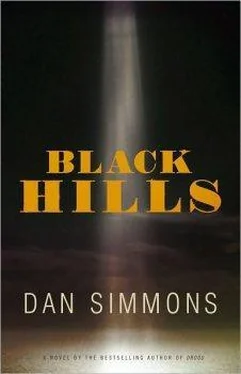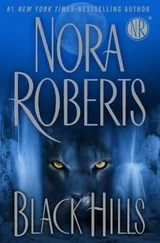Other akicita leaders coming up to the south fork of the Grand River area that sweltering, humid, stormy midsummer include Crazy Horse’s close friends Kicking Bear and Little Big Man. This last man—named for his short but powerfully built physique (the Sun Dance scars on Little Big Man’s chest are the most formidable Paha Sapa is ever to see, and Little Big Man goes shirtless until the snow is deep to show them off)—is especially famous among the Lakota, and the women and children and old men of Angry Badger’s band crowd and jostle to see and touch him when he first arrives. (Paha Sapa listens to Little Big Man brag about his braveries at Greasy Grass around the central fire that first night of his visit and thinks that such an immodest manner is not nearly so becoming as Crazy Horse’s silence and unwillingness to speak of his own victories, but the boy does see how the two friends tend to balance each other. Little Big Man is the threatener and corrector of undisciplined or unruly young warriors who follow them; Crazy Horse is the silent and frightening living legend.)
Angry Badger, who was not at Greasy Grass or at the fight with Cook on the Rosebud the week before, since he’d chosen to stay with his small band and lead them north after the last buffalo of the season, remains silent and glowering during these visits.
The story of the fight at the Greasy Grass and the rubbing out of Pehin Hanska , Long Hair Custer, increasingly dwells on the match-up between Pehin Hanska and Crazy Horse, and less and less on the leadership of Sitting Bull, eight winters older than Long Hair and too weakened by his Sun Dance flesh-cutting sacrifice to take part in the fighting that day. Sitting Bull’s vision, Paha Sapa increasingly understands through Limps-a-Lot, will always be considered as wonderfully wakan , but Crazy Horse’s leadership and fighting that day are becoming the material that gods are made of.
Inevitably, during his first four-day stay at Angry Badger’s tiyospaye (another twenty lodges have been raised by the visitors here along the creek that runs near Slim Buttes, outnumbering the size of the original village), Crazy Horse hears that the boy Paha Sapa was infected by a ghost during the fighting at Greasy Grass, and the battle chief demands to meet with the boy in Limps-a-Lot’s lodge. This terrifies Paha Sapa. He remembers all too well T’ašunka Witko ’s look of disgust when the near-naked heyoka warrior found Paha Sapa lying unwounded and gagging for air among the dead that afternoon of the battle.
But as terrified as Paha Sapa is, the summons to Limps-a-Lot’s lodge for his meeting with Crazy Horse has to be honored that second evening of the war chief’s first visit.
It is intolerably hot and humid, and though the sunset has thrown long shadows from the occasional cottonwoods and tipis and horses and grasses, the twilight brings no relief from the heat. Storm clouds move heavily in the south and north and east. Even though the sides of the tipis are raised as high as privacy and propriety allow, almost a grown man’s full arm length at Limps-a-Lot’s lodge, no cooling air moves beneath the heavy painted hides.
Paha Sapa is surprised to see that his interrogators consist only of Crazy Horse, one of his lieutenants named Run Fearless, their own leader, Angry Badger, the holy man Long Turd, old Loud Voice Hawk, and Limps-a-Lot. The women have been sent away. Even though it’s widely known that Crazy Horse loves his privacy and often goes off by himself for days or weeks at a time, there hasn’t been a moment so far in his visit to Angry Badger’s tiyospaye when the war chief has not been surrounded by his bodyguards, other chiefs, warriors, and Angry Badger’s people. Somehow the fact that it is only Crazy Horse, Run Fearless, Angry Badger, Long Turd, Loud Voice Hawk, and Paha Sapa’s tunkašila makes the boy even more apprehensive. His legs are shaking under his best deer-hide trousers.
Limps-a-Lot makes the introductions—although Paha Sapa was briefly introduced to Crazy Horse at the Greasy Grass—and then the six men and the boy sit in a circle. The tent hides have been rolled lower for privacy and sweat drips from the men’s noses and chins in the thick, still air.
There is no pipe, no ceremony, no prelude. Crazy Horse scowls at Paha Sapa as indifferently and apparently as disgustedly as he did on the battlefield more than two weeks earlier. When he speaks, the questions are directed directly at Paha Sapa, and the war chief’s voice is low but peremptory.
— Long Turd and others tell me that you can see people’s pasts and futures when you touch them. Is this true?
Paha Sapa’s heart pounds so wildly that he feels lightheaded.
— Sometimes…
He wanted to add an honorific to his answer, but Ate , Father, does not feel right with this fierce stranger. He leaves it off and hopes he does not receive a closed-fisted cuff for insolence.
— And is it true that a Wasicun’s ghost came into you near where I saw you lying and flopping around during the battle at the Greasy Grass on the day we killed Pehin Hanska?
— Yes , Tasunke Witko.
Paha Sapa prays that using Crazy Horse’s name with the proper tone of deference will be as respectful as an honorific.
Crazy Horse’s scowl remains the same.
— Was it Long Hair’s ghost?
— I do not know , Tasunke Witko.
— Does it speak to you?
— It speaks to… itself. Especially at night, when I hear it best.
— What does it say?
— I do not know , Tasunke Witko. It uses many words and all in a harsh rush, but the words are all in the tongue of the Wasicun.
— You do not understand any of them?
— No , Tasunke Witko. I am sorry.
Crazy Horse shakes his head as if angered by Paha Sapa’s apology.
— Are there any words that the ghost whispers more than once?
Paha Sapa licks his lips and thinks hard. Outside, thunder rumbles from the direction of the Black Hills. Somewhere a child laughs and two women squeal as if they are playing a game. Paha Sapa smells horseflesh and horse manure heavy in the thick summer air.
— There is the word … Li-BEE… Tasunke Witko. The ghost says it over and over. Li-BEE. But I have no idea what it means. It is as if he is saying it in pain, as though it were the source of a wound.
Crazy Horse turns to Run Fearless, Long Turd, and Loud Voice Hawk, but neither the chief nor holy man has heard this wasichu word before. Angry Badger also shakes his head while looking irritated at Paha Sapa and this entire conversation. Crazy Horse’s fierce glance moves to Paha Sapa’s tunkašila , but Limps-a-Lot only shrugs.
Crazy Horse barks to Run Fearless.
— Go bring in the Crow.
When Run Fearless returns, he is shoving and dragging along a Crow captive. The man’s hands are tied in front of him and his legs are hobbled like a horse’s. Paha Sapa guesses at once that this is one of the Crow scouts for the Seventh Cavalry whom Crazy Horse’s warriors captured and kept alive at the Greasy Grass; he has heard in campfire talk that there were three, but only one has been kept alive. This man is wearing torn and bloody clothes. His face is swollen with bruises, one eye looks to be permanently battered shut, and someone has been playfully torturing him—three fingers on his right hand are gone, two fingers on his left hand, and one ear has been cut away.
Not for the first time (or the last), Paha Sapa feels a strange reaction deep inside—a wave of disgust or disapproval, perhaps—but it is not his reaction. The Paha Sapa of almost eleven summers feels no compassion for this captured enemy. And it is certainly not his ghost’s reaction—Paha Sapa receives no emotions or thoughts from his ghost, only talk, talk, talk in the wasichus’ language. No, it is more as if there is another, perhaps older, but definitely a different Paha Sapa within Paha Sapa, always watching and reacting to things somewhat differently than does the boy named Paha Sapa. The effect is disconcerting.
Читать дальше












